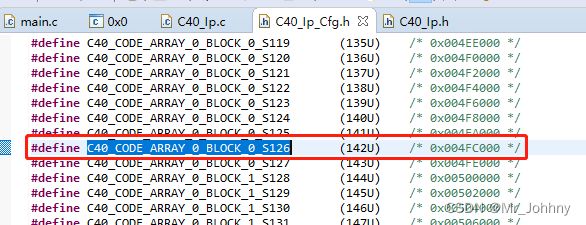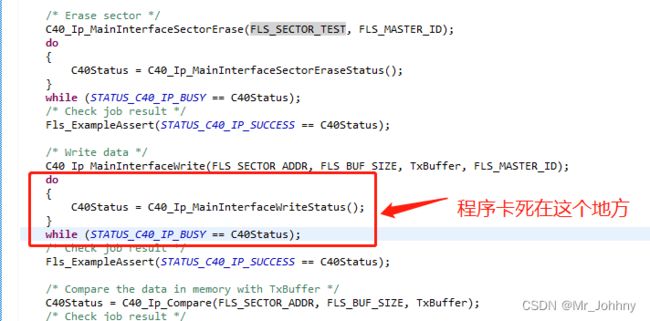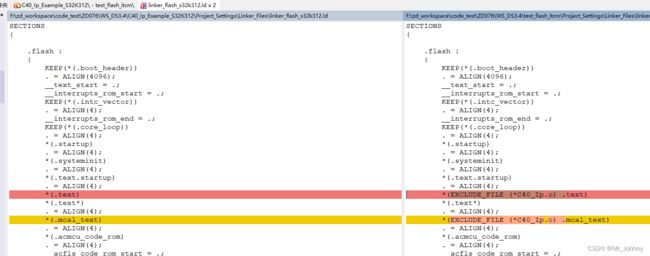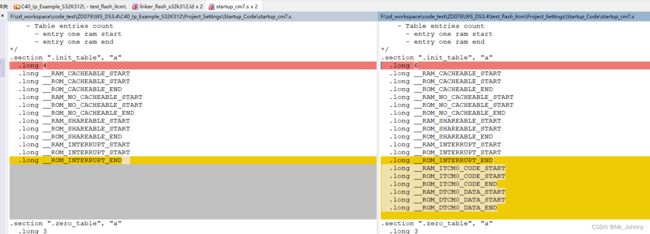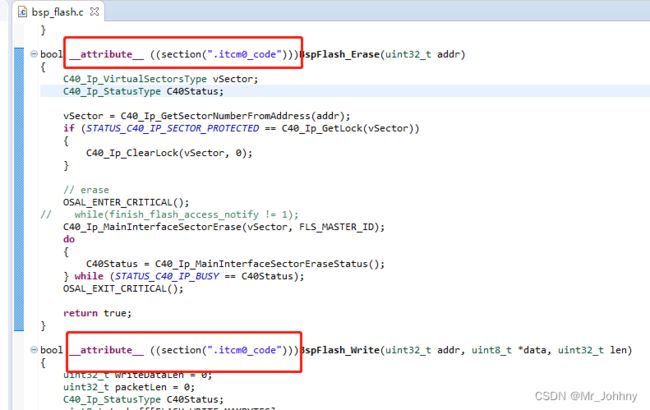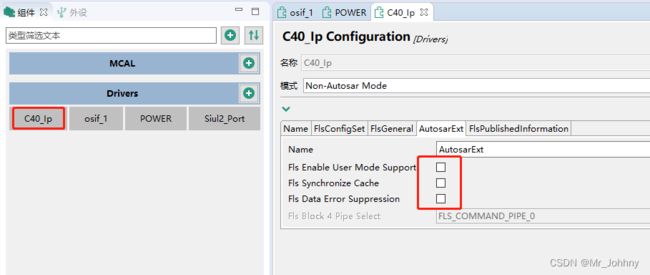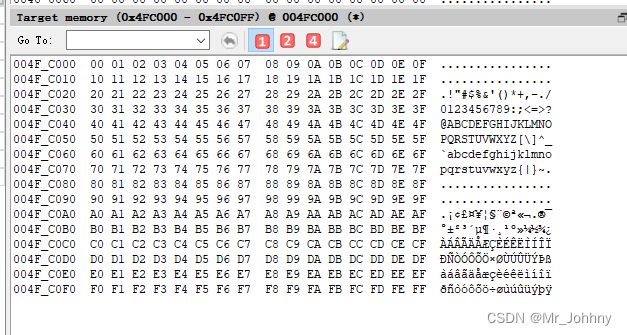S32K312使用ITCM向FLASH代码区写入数据
使用C40_IP的系列方法向FLASH代码区写入数据时,程序会卡死在读取写操作的状态C40_Ip_MainInterfaceWriteStatus()这个方法中。本文主要介绍S32K312通过ITCM的方式,通过C40_IP的方法向FLASH代码区成功写入数据的方法和步骤。
首先,验证一下C40_IP写入FLASH代码区时行不通的。通过官方例程的代码C40_IP_Example_S32K312,修改了2个参数,使得程序擦除和写入FLASH代码区:
修改完成后进行代码调试,找到程序卡死的地方
接下来描述,使用ITCM的方式对FLASH代码区进行擦除和写入,程序正常运行且结果达到预期的步骤:
1、ITCM的如何使用,参考《S32K312 ITCM代码使用示例》这篇文章。
几个注意事项
1.1、linker_flash_s32k312.ld这个文件需要修改一下
.ld文件的代码段
/*==================================================================================================
* Project : RTD AUTOSAR 4.4
* Platform : CORTEXM
* Peripheral :
* Dependencies : none
*
* Autosar Version : 4.4.0
* Autosar Revision : ASR_REL_4_4_REV_0000
* Autosar Conf.Variant :
* SW Version : 2.0.1
* Build Version : S32K3_RTD_2_0_1_D2207_ASR_REL_4_4_REV_0000_20220707
*
* (c) Copyright 2020 - 2022 NXP Semiconductors
* All Rights Reserved.
*
* NXP Confidential. This software is owned or controlled by NXP and may only be
* used strictly in accordance with the applicable license terms. By expressly
* accepting such terms or by downloading, installing, activating and/or otherwise
* using the software, you are agreeing that you have read, and that you agree to
* comply with and are bound by, such license terms. If you do not agree to be
* bound by the applicable license terms, then you may not retain, install,
* activate or otherwise use the software.
==================================================================================================*/
/*
* GCC Linker Command File:
* 0x00400000 0x001F3FFF 2047999 Program Flash (last 64K sBAF)
* 0x10000000 0x1003FFFF 262144 Data Flash (last 32K HSE_NVM)
* 0x20400000 0x20408000 32768 Standby RAM_0 (32K)
* 0x20400000 0x20417FFF 98304 SRAM_0 (96KB)
* Last 48 KB of SRAM_1 reserved by HSE Firmware
* Last 176 KB of CODE_FLASH_3 reserved by HSE Firmware
* Last 128 KB of DATA_FLASH reserved by HSE Firmware (not supported in this linker file)
*/
HEAP_SIZE = DEFINED(__heap_size__) ? __heap_size__ : 0x00002000;
ENTRY(Reset_Handler)
MEMORY
{
int_flash : ORIGIN = 0x00400000, LENGTH = 0x001D4000 /* 2048K - 176K (sBAF + HSE)*/
int_itcm : ORIGIN = 0x00000000, LENGTH = 0x00008000 /* 32K */
int_dtcm : ORIGIN = 0x20000000, LENGTH = 0x00010000 /* 64K */
int_sram : ORIGIN = 0x20400000, LENGTH = 0x00006F00 /* 27 KB */
int_sram_fls_rsv : ORIGIN = 0x20406F00, LENGTH = 0x00000100
int_sram_stack_c0 : ORIGIN = 0x20407000, LENGTH = 0x00001000
int_sram_no_cacheable : ORIGIN = 0x20408000, LENGTH = 0x00007F00 /* 32kb , needs to include int_results */
int_sram_results : ORIGIN = 0x2040FF00, LENGTH = 0x00000100
int_sram_shareable : ORIGIN = 0x20410000, LENGTH = 0x00008000 /* 32KB */
ram_rsvd2 : ORIGIN = 0x20418000, LENGTH = 0 /* End of SRAM */
}
SECTIONS
{
.flash :
{
KEEP(*(.boot_header))
. = ALIGN(4096);
__text_start = .;
__interrupts_rom_start = .;
KEEP(*(.intc_vector))
. = ALIGN(4);
__interrupts_rom_end = .;
KEEP(*(.core_loop))
. = ALIGN(4);
*(.startup)
. = ALIGN(4);
*(.systeminit)
. = ALIGN(4);
*(.text.startup)
. = ALIGN(4);
*(EXCLUDE_FILE (*C40_Ip.o) .text)
*(.text*)
. = ALIGN(4);
*(EXCLUDE_FILE (*C40_Ip.o) .mcal_text)
. = ALIGN(4);
*(.acmcu_code_rom)
. = ALIGN(4);
__acfls_code_rom_start = .;
*(.acfls_code_rom)
. = ALIGN(4);
__acfls_code_rom_end = .;
KEEP(*(.init))
. = ALIGN(4);
KEEP(*(.fini))
. = ALIGN(4);
*(.rodata)
*(.rodata*)
. = ALIGN(4);
*(.mcal_const_cfg)
. = ALIGN(4);
*(.mcal_const)
. = ALIGN(4);
__init_table = .;
KEEP(*(.init_table))
. = ALIGN(4);
__zero_table = .;
KEEP(*(.zero_table))
} > int_flash
. = ALIGN(4);
__text_end = .;
__sram_data_rom = __text_end;
.sram_data : AT(__sram_data_rom)
{
. = ALIGN(4);
__sram_data_begin__ = .;
. = ALIGN(4);
*(.ramcode)
. = ALIGN(4);
*(.data)
*(.data*)
. = ALIGN(4);
*(.mcal_data)
. = ALIGN(4);
__sram_data_end__ = .;
} > int_sram
__sram_data_rom_end = __sram_data_rom + (__sram_data_end__ - __sram_data_begin__);
.sram_bss (NOLOAD) :
{
. = ALIGN(16);
__sram_bss_start = .;
*(.bss)
*(.bss*)
. = ALIGN(16);
*(.mcal_bss)
. = ALIGN(4);
__sram_bss_end = .;
} > int_sram
/* heap section */
.heap (NOLOAD):
{
. += ALIGN(4);
_end = .;
end = .;
_heap_start = .;
. += HEAP_SIZE;
_heap_end = .;
} > int_sram
.acfls_code_ram :
{
acfls_code_ram_start = .;
*(.acfls_code_ram)
acfls_code_ram_stop = .;
} > int_sram_fls_rsv
__non_cacheable_data_rom = __sram_data_rom_end;
.non_cacheable_data : AT(__non_cacheable_data_rom)
{
. = ALIGN(4);
__non_cacheable_data_start__ = .;
. = ALIGN(4096);
__interrupts_ram_start = .;
. += __interrupts_rom_end - __interrupts_rom_start;
. = ALIGN(4);
__interrupts_ram_end = .;
*(.mcal_data_no_cacheable)
. = ALIGN(4);
*(.mcal_const_no_cacheable)
. = ALIGN(4);
HSE_LOOP_ADDR = .;
LONG(0x0);
__non_cacheable_data_end__ = .;
} > int_sram_no_cacheable
int_results (NOLOAD):
{
. = ALIGN(4);
KEEP(*(.int_results))
. += 0x100;
} > int_sram_results
__non_cacheable_data_rom_end = __non_cacheable_data_rom + (__non_cacheable_data_end__ - __non_cacheable_data_start__);
.non_cacheable_bss (NOLOAD) :
{
. = ALIGN(16);
__non_cacheable_bss_start = .;
*(.mcal_bss_no_cacheable)
. = ALIGN(4);
__non_cacheable_bss_end = .;
} > int_sram_no_cacheable
__shareable_data_rom = __non_cacheable_data_rom_end;
.shareable_data : AT(__shareable_data_rom)
{
. = ALIGN(4);
__shareable_data_start__ = .;
KEEP(*(.mcal_shared_data))
. = ALIGN(4);
__shareable_data_end__ = .;
} > int_sram_shareable
__shareable_data_rom_end = __shareable_data_rom + (__shareable_data_end__ - __shareable_data_start__);
.shareable_bss (NOLOAD) :
{
. = ALIGN(16);
__shareable_bss_start = .;
*(.mcal_shared_bss)
. = ALIGN(4);
__shareable_bss_end = .;
} > int_sram_shareable
__itcm0_code_rom = __shareable_data_rom_end;
.itcm0_code : AT(__itcm0_code_rom)
{
. = ALIGN(4);
__itcm0_code_start__ = .;
KEEP(*(.itcm0_code))
KEEP(*C40_Ip.o(.mcal_text*))
KEEP(*C40_Ip.o(.text*))
. = ALIGN(4);
__itcm0_code_end__ = .;
} > int_itcm
__itcm0_code_rom_end = __itcm0_code_rom + (__itcm0_code_end__ - __itcm0_code_start__);
__dtcm0_data_rom = __itcm0_code_rom_end;
.dtcm0_data : AT(__dtcm0_data_rom)
{
. = ALIGN(4);
__dtcm0_data_start__ = .;
KEEP(*(.dtcm0_data))
. = ALIGN(4);
__dtcm0_data_end__ = .;
} > int_dtcm
__dtcm0_data_rom_end = __dtcm0_data_rom + (__dtcm0_data_end__ - __dtcm0_data_start__);
__Stack_end_c0 = ORIGIN(int_sram_stack_c0);
__Stack_start_c0 = ORIGIN(int_sram_stack_c0) + LENGTH(int_sram_stack_c0);
__Stack_end_c1 = 0;
__Stack_start_c1 = 0;
__INT_SRAM_START = ORIGIN(int_sram);
__INT_SRAM_END = ORIGIN(ram_rsvd2);
__INT_ITCM_START = ORIGIN(int_itcm);
__INT_ITCM_END = ORIGIN(int_itcm) + LENGTH(int_itcm);
__INT_DTCM_START = ORIGIN(int_dtcm);
__INT_DTCM_END = ORIGIN(int_dtcm) + LENGTH(int_dtcm);
__RAM_SHAREABLE_START = ORIGIN(int_sram_shareable);
__RAM_SHAREABLE_END = ORIGIN(ram_rsvd2)-1;
__RAM_SHAREABLE_SIZE = 0xF;
__ROM_SHAREABLE_START = __shareable_data_rom;
__ROM_SHAREABLE_END = __shareable_data_rom_end;
__RAM_NO_CACHEABLE_START = ORIGIN(int_sram_no_cacheable);
__RAM_NO_CACHEABLE_END = ORIGIN(int_sram_shareable)-1;
__RAM_NO_CACHEABLE_SIZE = 0xF; /* 32kbyte in power of 2 */
__ROM_NO_CACHEABLE_START = __non_cacheable_data_rom;
__ROM_NO_CACHEABLE_END = __non_cacheable_data_rom_end;
__RAM_CACHEABLE_START = ORIGIN(int_sram);
__RAM_CACHEABLE_END = ORIGIN(int_sram_no_cacheable)-1;
__RAM_CACHEABLE_SIZE = 0xF; /* 32kbyte in power of 2 */
__ROM_CACHEABLE_START = __sram_data_rom;
__ROM_CACHEABLE_END = __sram_data_rom_end;
__ROM_CODE_START = ORIGIN(int_flash);
__ROM_DATA_START = 0x10000000;
__RAM_ITCM0_CODE_START = __itcm0_code_start__;
__ROM_ITCM0_CODE_START = __itcm0_code_rom;
__ROM_ITCM0_CODE_END = __itcm0_code_rom_end;
__RAM_DTCM0_DATA_START = __dtcm0_data_start__;
__ROM_DTCM0_DATA_START = __dtcm0_data_rom;
__ROM_DTCM0_DATA_END = __dtcm0_data_rom_end;
__BSS_SRAM_START = __sram_bss_start;
__BSS_SRAM_END = __sram_bss_end;
__BSS_SRAM_SIZE = __sram_bss_end - __sram_bss_start;
__BSS_SRAM_NC_START = __non_cacheable_bss_start;
__BSS_SRAM_NC_SIZE = __non_cacheable_bss_end - __non_cacheable_bss_start;
__BSS_SRAM_NC_END = __non_cacheable_bss_end;
__BSS_SRAM_SH_START = __shareable_bss_start;
__BSS_SRAM_SH_SIZE = __shareable_bss_end - __shareable_bss_start;
__BSS_SRAM_SH_END = __shareable_bss_end;
__RAM_INTERRUPT_START = __interrupts_ram_start;
__ROM_INTERRUPT_START = __interrupts_rom_start;
__ROM_INTERRUPT_END = __interrupts_rom_end;
__INIT_TABLE = __init_table;
__ZERO_TABLE = __zero_table;
__RAM_INIT = 1;
__ITCM_INIT = 1;
__DTCM_INIT = 1;
Fls_ACEraseRomStart = __acfls_code_rom_start;
Fls_ACEraseRomEnd = __acfls_code_rom_end;
Fls_ACEraseSize = (__acfls_code_rom_end - __acfls_code_rom_start) / 4; /* Copy 4 bytes at a time*/
Fls_ACWriteRomStart = __acfls_code_rom_start;
Fls_ACWriteRomEnd = __acfls_code_rom_end;
Fls_ACWriteSize = (__acfls_code_rom_end - __acfls_code_rom_start) / 4; /* Copy 4 bytes at a time*/
_ERASE_FUNC_ADDRESS_ = ADDR(.acfls_code_ram);
_WRITE_FUNC_ADDRESS_ = ADDR(.acfls_code_ram);
__ENTRY_VTABLE = __ROM_INTERRUPT_START;
__CORE0_VTOR = __interrupts_rom_start;
__CORE1_VTOR = __interrupts_rom_start;
}
1.2、startup_cm7.s文件需要调整一下,主要变化的内容:
1.3、封装读/写/擦除的方法需要增加前缀,如
2、C40_IP组件添加和配置
配置完成后要生成一下代码。
3、准备测试代码
/*==================================================================================================
* Project : RTD AUTOSAR 4.4
* Platform : CORTEXM
* Peripheral : S32K3XX
* Dependencies : none
*
* Autosar Version : 4.4.0
* Autosar Revision : ASR_REL_4_4_REV_0000
* Autosar Conf.Variant :
* SW Version : 2.0.1
* Build Version : S32K3_RTD_2_0_1_D2207_ASR_REL_4_4_REV_0000_20220707
*
* (c) Copyright 2020 - 2021 NXP Semiconductors
* All Rights Reserved.
*
* NXP Confidential. This software is owned or controlled by NXP and may only be
* used strictly in accordance with the applicable license terms. By expressly
* accepting such terms or by downloading, installing, activating and/or otherwise
* using the software, you are agreeing that you have read, and that you agree to
* comply with and are bound by, such license terms. If you do not agree to be
* bound by the applicable license terms, then you may not retain, install,
* activate or otherwise use the software.
==================================================================================================*/
/**
* @file main.c
*
* @addtogroup main_module main module documentation
* @{
*/
/* Including necessary configuration files. */
#include "Mcal.h"
#include "Clock_Ip.h"
#include "C40_Ip.h"
#include "Power_Ip.h"
#include "Power_Ip_MC_ME.h"
volatile int exit_code = 0;
/* User includes */
#include "bsp_flash.h"
#include "SEGGER_RTT_Conf.h"
#include "SEGGER_RTT.h"
#include
#define FLS_BUF_SIZE 256U
#define FLS_SECTOR_ADDR 0x004FC000
uint8 TxBuffer[FLS_BUF_SIZE];
uint8 RxBuffer[FLS_BUF_SIZE];
void Fls_InitBuffers(void)
{
uint32 Index;
for (Index = 0U; Index < FLS_BUF_SIZE; Index++)
{
TxBuffer[Index] = (uint8)Index;
RxBuffer[Index] = 0U;
}
}
void bsp_flash_delay(uint32 delay)
{
static volatile uint32 DelayTimer = 0;
while(DelayTimer> 4);
LOG_Data[i*3 +0] = (value <= 9)? value +'0' : value -10 + 'A';
value = ((*(pData+i))&0x0F);
LOG_Data[i*3 +1] = (value <= 9)? value +'0' : value -10 + 'A';
LOG_Data[i*3 +2] = ' ';
}
SEGGER_RTT_printf(0, "%s\n", LOG_Data);
}
void flash_test(void)
{
uint8_t res;
/* Initialize buffers */
Fls_InitBuffers();
res = BspFlash_Erase(FLS_SECTOR_ADDR);
if(res == true)
{
bsp_flash_delay(4800000);
}
res = BspFlash_Write(FLS_SECTOR_ADDR, &TxBuffer[0], FLS_BUF_SIZE);
if(res == true)
{
bsp_flash_delay(4800000);
}
}
/*!
\brief The main function for the project.
\details The startup initialization sequence is the following:
* - startup asm routine
* - main()
*/
int main(void)
{
/* Write your code here */
Clock_Ip_Init(&Clock_Ip_aClockConfig[0]);
C40_Ip_Init(&C40ConfigSet_BOARD_InitPeripherals_InitCfg);
flash_test();
for(;;)
{
if(exit_code != 0)
{
break;
}
}
return exit_code;
}
/** @} */
4、编译运行,及查看结果
通过J-Flash读取芯片中的数据,可以看到数据写入成功了。

